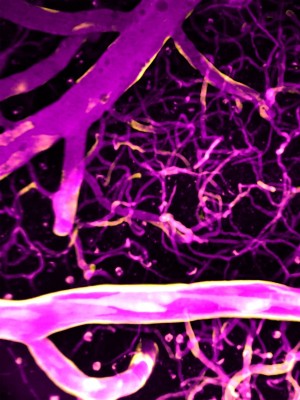January 06, 2023 | Heide Aungst
NeMO Archive Provides User-Friendly Research Tool to Help Neuroscientists Understand How the Brain Works
 Neuroscience researchers now have access to 50 million brain cells to better understand how the brain develops and functions or changes with disease or trauma. In November, scientists at the University of Maryland School of Medicine’s (UMSOM) Institute for Genome Sciences (IGS) unveiled a “one-stop shop” for brain cell data called the Neuroscience Multi-Omic Archive (NeMO Archive). This archive is now available to neuroscience researchers to transform their understanding of the complex workings of the brain.
Neuroscience researchers now have access to 50 million brain cells to better understand how the brain develops and functions or changes with disease or trauma. In November, scientists at the University of Maryland School of Medicine’s (UMSOM) Institute for Genome Sciences (IGS) unveiled a “one-stop shop” for brain cell data called the Neuroscience Multi-Omic Archive (NeMO Archive). This archive is now available to neuroscience researchers to transform their understanding of the complex workings of the brain.
IGS researchers published a technical description, including accessible links to the new resource, in the November issue of Nucleic Acids Research. The expectation is that these cell-type atlases will have a transformative impact on neuroscience research more broadly, including for studies that focus on how each cell type changes in conditions such as Alzheimer’s disease, Parkinson’s disease, schizophrenia, or substance abuse disorders.
“The NeMO Archive is the most comprehensive repository for genomic data on cellular diversity in the human and mouse brain,” said Seth Ament, PhD, Associate Professor of Psychiatry at UMSOM, IGS scientist, and a lead author on the paper. “Once our consortium finishes analyzing the data, I believe we will have a more rigorous understanding of the cell types of the brain than any previous study or resource,” he said.
The NeMO Archive is a curated genomic data repository funded by the National Institutes of Health Brain Research Through Advancing Innovative Neurotechnologies (BRAIN) Initiative, which is housed at IGS. So far, most data in the NeMO Archive has come from a consortium primarily focused on mapping cell types in the mouse brain. As the archive continues to develop, additional data will come from a new consortium that is focusing on the human brain.
The ultimate goal is to create comprehensive maps for the diversity of cells in the mammalian brain, providing precise descriptions for thousands of distinct cell types in more than 100 brain regions.
 The role of the NeMO Archive is to assemble all of this data into a centralized resource that is easy for the neuroscience community to find and use. It currently contains transcriptomic, epigenomic, and spatial transcriptomic data from more than 50 million brain cells.
The role of the NeMO Archive is to assemble all of this data into a centralized resource that is easy for the neuroscience community to find and use. It currently contains transcriptomic, epigenomic, and spatial transcriptomic data from more than 50 million brain cells.
“The data housed in the NeMO Archive is easily accessible to researchers at nemoarchive.org,” said Owen White, PhD, Professor of Epidemiology and Public Health at UMSOM, Associate Director of IGS, and a lead author on the paper. , and. “Our team developed several user-friendly interface tools to make its use simple, including a searchable web portal, a cloud-computing interface for large-scale data processing, and the ability to download data from the cloud to a local visualization and analysis platform called NeMO Analytics available at nemoanalytics.org,” he said.
Other IGS faculty who were co-authors on the study include Michelle Giglio, PhD, Associate Professor, Medicine, UMSOM; Associate Director of Analysis, IGS; Ronna Hertzano, MD, PhD, Professor, Otorhinolaryngology, Head & Neck Surgery, UMSOM; Affiliate Faculty, IGS; and Anup A. Mahurkar, MIM, Director of Software Engineering and Information Technology, IGS.
 “We know the brain has billions of neurons connected by trillions of synapses, but precise definitions for all the types and subtypes of these have been elusive to scientists,” said Mark Gladwin, MD, Dean, University of Maryland School of Medicine, Vice President for Medical Affairs, University of Maryland, Baltimore, and the John Z. and Akiko K. Bowers Distinguished Professor. “By better understanding specific cells within the brain, biologists will be able to analyze particular genes and how they influence the function of the brain, such as the known genes for Alzheimer’s or autism.”
“We know the brain has billions of neurons connected by trillions of synapses, but precise definitions for all the types and subtypes of these have been elusive to scientists,” said Mark Gladwin, MD, Dean, University of Maryland School of Medicine, Vice President for Medical Affairs, University of Maryland, Baltimore, and the John Z. and Akiko K. Bowers Distinguished Professor. “By better understanding specific cells within the brain, biologists will be able to analyze particular genes and how they influence the function of the brain, such as the known genes for Alzheimer’s or autism.”
The work for the NeMO Archive is supported by an original $6.4 million grant from the National Institute of Mental Health covering 2017 to 2022 and has recently been renewed with an additional $8.5 million to extend the project through 2027. The grant was funded by the National Institutes of Health: R24 MH114788; R24 MH114815; UM1 DA052244; R01 DC019370.
No conflicts of interest declared.
In addition to the NeMO Archive, UMSOM has established a new neuroscience institute that will accelerate translational research of the brain by facilitating interaction between basic and clinical scientists and enhancing collaborative research across the UMSOM and University of Maryland, Baltimore (UMB) campus. The institute, called the University of Maryland-Medicine Institute for Neuroscience Discovery (UM-MIND), was launched late last year.
About the University of Maryland School of Medicine
Now in its third century, the University of Maryland School of Medicine was chartered in 1807 as the first public medical school in the United States. It continues today as one of the fastest growing, top-tier biomedical research enterprises in the world -- with 46 academic departments, centers, institutes, and programs, and a faculty of more than 3,000 physicians, scientists, and allied health professionals, including members of the National Academy of Medicine and the National Academy of Sciences, and a distinguished two-time winner of the Albert E. Lasker Award in Medical Research. With an operating budget of more than $1.3 billion, the School of Medicine works closely in partnership with the University of Maryland Medical Center and Medical System to provide research-intensive, academic and clinically based care for nearly 2 million patients each year. The School of Medicine has nearly $600 million in extramural funding, with most of its academic departments highly ranked among all medical schools in the nation in research funding. As one of the seven professional schools that make up the University of Maryland, Baltimore campus, the School of Medicine has a total population of nearly 9,000 faculty and staff, including 2,500 students, trainees, residents, and fellows. The combined School of Medicine and Medical System (“University of Maryland Medicine”) has an annual budget of over $6 billion and an economic impact of nearly $20 billion on the state and local community. The School of Medicine, which ranks as the 8th highest among public medical schools in research productivity (according to the Association of American Medical Colleges profile) is an innovator in translational medicine, with 606 active patents and 52 start-up companies. In the latest U.S. News & World Report ranking of the Best Medical Schools, published in 2021, the UM School of Medicine is ranked #9 among the 92 public medical schools in the U.S., and in the top 15 percent (#27) of all 192 public and private U.S. medical schools. The School of Medicine works locally, nationally, and globally, with research and treatment facilities in 36 countries around the world. Visit medschool.umaryland.edu
About the Institute for Genome Sciences
The Institute for Genome Sciences (IGS) at the University of Maryland School of Medicine has revolutionized genomic discoveries in medicine, agriculture, environmental science, and biodefense since its founding in 2007. IGS investigators research areas of genomics and the microbiome to better understand health and disease, including treatments, cures, and prevention. IGS investigators also lead the development of the new field of microbial forensics. IGS is a leading center for major biological initiatives currently underway including the NIH-funded Human Microbiome Project (HMP) and the NIAID-sponsored Genomic Sequencing Center for Infectious Diseases (GSCID). Follow us on Twitter @GenomeScience.
Contact
Heide Aungst
HAungst@som.umaryland.edu
216-970-5773 (cell)
Related stories

Wednesday, April 02, 2025
Researchers Reveal Key Brain Differences to Explain Why Ritalin Helps Improve Focus in Some More Than Others
Nearly 16 million American adults have been diagnosed with attention deficit hyperactivity disorder (ADHD), but evidence suggests that more than 30 percent of them don’t respond well to stimulant medications like Ritalin and Adderall. A new clinical trial provides a surprising explanation for why this may be the case: There are individual differences in how our brains circuits are wired, including the chemical circuits responsible for memory and concentration, according to a new study co-led by the University of Maryland School of Medicine (UMSOM) and performed at the National Institutes of Health (NIH) Clinical Center.

Tuesday, December 19, 2023
UM School of Medicine Review Highlights Rise in Psychiatric Disorders Linked to Increased Cannabis Use
The widespread use of cannabis (marijuana) and its increased potency are associated with a rise in cannabis-related psychiatric conditions, according to a new University of Maryland School of Medicine (UMSOM) review article that was recently published in the New England Journal of Medicine. It highlights the urgent need for doctors to screen for and treat patients who are experiencing symptoms of cannabis use disorder, which means they are experiencing significant problems from their use of the drug.

Friday, December 08, 2023
UM School of Medicine Celebrates the Life and Legacy of Former Psychiatry Chair, John A. Talbott, MD
It is with deep sorrow that we announce the news of the passing of internationally renowned psychiatrist John A. Talbott, MD, former Chair of Psychiatry and Professor Emeritus at the University of Maryland School of Medicine (UMSOM).

Thursday, October 12, 2023
New Research Shows How Brain Inflammation in Children May Cause Neurological Disorders Such as Autism or Schizophrenia
Severe inflammation in early childhood is a clinically known risk factor for developing autism and schizophrenia. Now, for the first time, scientists from the University of Maryland School of Medicine (UMSOM) have discovered that inflammation alters the development of vulnerable brain cells, and this could have mechanistic links to neurodevelopmental disorders. This finding could lead to treatments for many different childhood-onset neurodevelopmental disorders.
.jpg)
Wednesday, May 03, 2023
University of Maryland School of Medicine Genomic Scientist Claire M. Fraser Elected to the National Academy of Sciences
The National Academy of Sciences (NAS) has announced that Claire M. Fraser, PhD, the Dean E. Albert Reece Endowed Professor in the Department of Medicine at the University of Maryland School of Medicine (UMSOM), and the Founding Director of the Institute for Genome Sciences (IGS), has been elected as a new member of the prestigious academy. Dr. Fraser is one of 120 U.S. and 23 international new members elected on May 2, 2023 to the NAS, bringing its total U.S. membership to 2,565 members.

Tuesday, April 25, 2023
Immune System Sculpts Rat Brains During Development
Researchers have established that biological sex plays a role in determining an individual’s risk of brain disorders. For example, boys are more likely to be diagnosed with behavioral conditions like autism or attention deficit disorder, whereas women are more likely to suffer from anxiety disorders, depression, or migraines. However, experts do not fully understand how sex contributes to brain development, particularly in the context of these diseases. They think, in part, it may have something to do with the differing sizes of certain brain regions.

Thursday, April 20, 2023
Researchers Discover Unique Genetic Signature for Mood Disorders in the Old Order Amish
Understanding the root causes of depression, bipolar disorder, and other mental illnesses could lead to new treatments for the 300 million people worldwide who suffer from such conditions.

Friday, March 31, 2023
Traumatic Brain Injury Interferes with Immune System Cells’ Recycling Process in Brain Cells
Each year about 1.5 million people in the U.S. survive a traumatic brain injury due to a fall, car accident, or a sports injury, which can cause immediate and long-term disability.
.jpg)
Wednesday, March 01, 2023
Internationally-Renowned Scientist Claire Fraser, PhD, To Step Down as Director of the University of Maryland School of Medicine's Institute for Genome Sciences
Claire Fraser, PhD, a pioneer and global leader in genomic research, has announced that she will step down from her position as Director of the Institute for Genome Sciences (IGS) in the University of Maryland School of Medicine (UMSOM). She will now continue as the Dean E. Albert Reece Endowed Professor and Professor of Medicine and Microbiology and Immunology at UMSOM and scientist at IGS until she retires in 2024.

Monday, November 14, 2022
Brain Area Thought to Impart Consciousness, Behaves Instead Like an Internet Router
Tucked underneath the brain’s outer, wrinkly cortex is a deeply mysterious area, known as the claustrum. This region has long been known to exchange signals with much of the cortex, which is responsible for higher reasoning and complex thought. Because of the claustrum’s extensive connections, the legendary scientist Francis Crick, PhD, of DNA-discovery fame, first postulated in 2005 that the claustrum is the seat of consciousness. In other words, the region of the brain enabling awareness of the world and ourselves.

Tuesday, August 30, 2022
Effects of Drugs in Mice can Depend on the Sex of the Human Experimenter
University of Maryland School of Medicine researchers demonstrated that a stress response in the brain is essential for ketamine’s antidepressant response in mice suggesting new ways to improve antidepressant therapy for patients who do not respond to the treatment.

Thursday, September 23, 2021
Dr. Deanna Kelly Appointed New Chair of Institutional Review Board for the Maryland Department of Health
Deanna Kelly, PharmD, Professor of Psychiatry at the University of Maryland School of Medicine (UMSOM), has been appointed to lead the prestigious committee of experts who review and approve all proposed research projects involving human participants for the Maryland Department of Health (MDH). She will chair the MDH Institutional Review Board (IRB) for the next four years, a position she started in July.

Wednesday, July 21, 2021
University of Maryland School of Medicine Study Finds Calcium Precisely Directs Blood Flow in the Brain
University of Maryland School of Medicine and University of Vermont researchers have shown how the brain communicates to blood vessels when in need of energy, and how these blood vessels respond by relaxing or constricting to direct blood flow to specific brain regions.

Wednesday, February 10, 2021
UM School of Medicine Researchers Release Extensive Data on Rare Variants through NHLBI TopMed Grant
Researchers at the University of Maryland School of Medicine (UMSOM) and their colleagues published a new analysis today in the journal Nature from genetic sequencing data of more than 53,000 individuals, primarily from minority populations. The early analysis, part of a large-scale program funded by the National Heart, Lung, and Blood Institute, examines one of the largest and most diverse data sets of high-quality whole genome sequencing, which makes up a person’s DNA. It provides new genetic insights into heart, lung, blood, and sleep disorders and how these conditions impact people with diverse racial and ethnic backgrounds, who are often underrepresented in genetic studies.

Wednesday, September 25, 2019
Dr. Tracy Bale Elected President of the International Brain Research Organization
Tracy L. Bale, PhD, Professor of Pharmacology and Director of the Center for Epigentic Research in Child Health & Brain Development has been elected President of the International Brain Research Organization.

Monday, April 29, 2019
UMSOM’s Reading on the Brain Program Teaches Baltimore City Elementary Students About the Brain-Building Power of Reading
Acting Baltimore City Mayor Jack Young joined 4th and 5th grade students at Callaway Elementary School to help paint a mural about the brain. It was all part of Reading on the Brain, a University of Maryland School of Medicine (UMSOM) program to teach young students about the importance of reading and how reading can stimulate brain development and inspire future success. Tracy Bale, PhD, is leading the pilot program, which also emphasizes science and helps children to understand how the brain works.

Thursday, April 04, 2019
UM School of Medicine's Institute for Genome Sciences Awarded $17.5 Million Grant for Infectious Disease Research
The Institute for Genome Sciences (IGS) at the University of Maryland School of Medicine (UMSOM) was awarded $17.5 million from the National Institute of Allergy and Infectious Diseases (NIAID) to fund the IGS Genome Center for Infectious Diseases (GCID) for another five years.

Thursday, March 28, 2019
Allergic Reactions Play Role in Sexual Behavior Development in Unborn Males and Females, UMSOM Research Shows
Researchers at the University of Maryland School of Medicine and colleagues at Ohio State University have discovered that allergic reactions trigger changes in brain behavior development in unborn males and females. This latest brain development discovery will ultimately help researchers better understand how neurological conditions can differ between men and women.

Friday, March 01, 2019
UMSOM Researchers Discover Clues to Brain Differences Between Males and Females
Researchers at the University of Maryland School of Medicine have discovered a mechanism for how androgens -- male sex steroids -- sculpt brain development. The research, conducted by Margaret M. McCarthy, Ph.D., Professor of Pharmacology and Chair of the Department of Pharmacology, could ultimately help researchers understand behavioral development differences between males and females.

Thursday, September 27, 2018
University of Maryland School of Medicine Scientist Receives Prestigious Microbiome Award
Owen White, PhD, professor of epidemiology and public health, and Associate Director for Informatics at the Institute for Genome Sciences (IGS) at the University of Maryland School of Medicine (UMSOM), has received the 2018 Microbiome Pioneer Award. The prestigious honor is part of the Bioinformatics for the Microbiome Symposium organized by Stanford University. The microbiome is the name given collectively to the community of trillions of microbial organisms that live on and within our bodies.

Thursday, December 07, 2017
University of Maryland School of Medicine Scientists Identify the First Brain Cells to Respond to Sound
Some expectant parents play classical music for their unborn babies, hoping to boost their children’s cognitive capacity. While some research supports a link between prenatal sound exposure and improved brain function, scientists had not identified any structures responsible for this link in the developing brain.
Wednesday, June 07, 2017
Dr. Jill RachBeisel Named Vice Chair for Clinical Affairs in UM School of Medicine’s Department of Psychiatry
Bankole A. Johnson, DSc, MD, MBChB, The Dr. Irving J. Taylor Professor and Chair for the Department of Psychiatry, Professor of Pharmacology, Anatomy and Neurobiology, along with UM SOM Dean E. Albert Reece, MD, PhD, MBA, announced today that Jill RachBeisel, MD, Associate Professor of Psychiatry, has been named Vice Chair for Clinical Affairs for the UM SOM Department of Psychiatry, commencing at the start of the next academic year.

